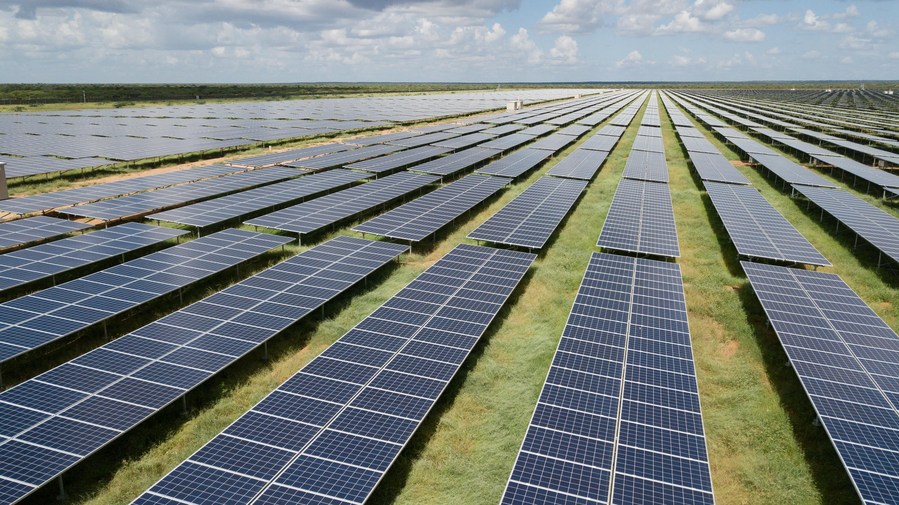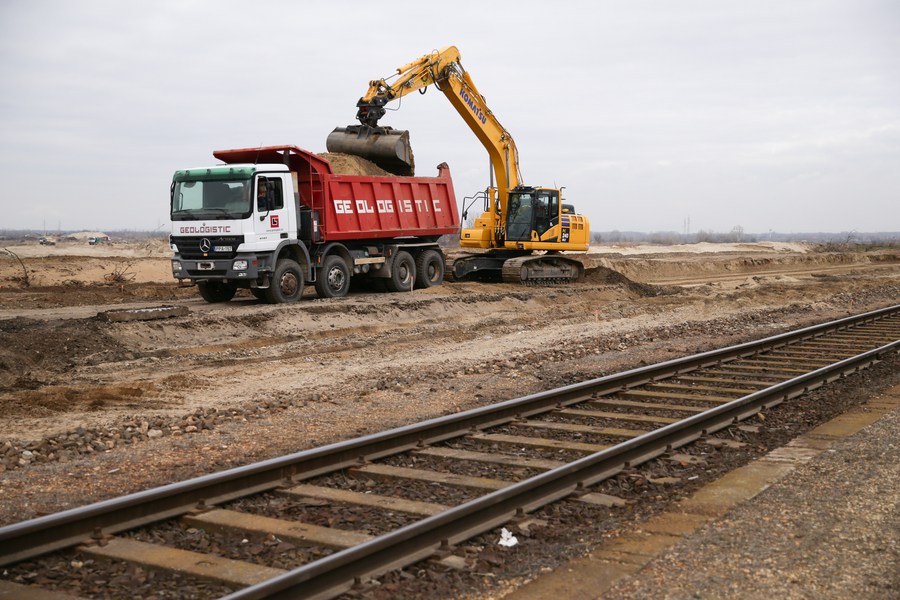* As the Belt and Road Initiative is embracing its next golden decade, this pivotal consensus on high-quality Belt and Road cooperation by participating countries bears high significance. Through joint efforts, the initiative is poised to generate fresh opportunities for the global economy and bestow greater benefits.
* As the initiator of the BRI, China has been actively promoting small-scale yet impactful projects through. The construction of roads, railways, schools, hospitals and agricultural facilities has helped alleviate poverty and improve people's well-being in the world's most needed places.
* The BRI's success during the last decade is based on its core principles of extensive consultation, joint contribution and shared benefits that promote multilateralism as well as equitable and just global governance.
* The BRI has created a cooperation platform for common development and helped many developing countries speed up their march toward modernization.
BEIJING, Oct. 20 (Xinhua) -- The just-concluded forum here in celebration of the 10th anniversary of the Belt and Road Initiative (BRI) signifies a landmark milestone in the Belt and Road cooperation.
In a keynote speech at the third Belt and Road Forum for International Cooperation, Chinese President Xi Jinping pledged that China will work with all parties involved to usher Belt and Road cooperation into a new stage of high-quality development and make relentless efforts to achieve modernization for all countries.
As the initiative is embracing its next golden decade, this pivotal consensus on high-quality Belt and Road cooperation by participating countries bears high significance. Through joint efforts, the initiative is poised to generate fresh opportunities for the global economy and bestow greater benefits.
CHANCE FOR GLOBAL SOUTH
The BRI has created favorable development conditions for Global South countries, said Cambodian Prime Minister Hun Manet.
The initiative has improved infrastructure, attracted foreign direct investment, driven economic growth, accelerated regional and global integration, and boosted people-to-people exchanges, Hun Manet noted.

This aerial photo taken on Dec. 13, 2019 shows a 50 MW solar power farm in Garissa, Kenya. (Xinhua/Xie Han)
As the initiator of the BRI, China has been actively promoting small-scale yet impactful projects through. The construction of roads, railways, schools, hospitals and agricultural facilities has helped alleviate poverty and improve people's well-being in the world's most needed places.
Statistics show that the BRI has helped lift about 40 million people out of poverty in participating countries. It has also galvanized up to 1 trillion U.S. dollars of investment globally and created more than 3,000 projects and 420,000 jobs over the past decade.
A report by global economic consultants Cebr estimated that the BRI is likely to boost world GDP by 7.1 trillion dollars per annum by 2040.
As an observer, Damilola Ogunbiyi, special representative of the UN secretary-general for sustainable energy for all, said the BRI can advance renewable energy adoption across the Global South countries in the next decade.
"As the world's largest manufacturer of solar panels, wind turbines, batteries and electric vehicles, China is well-placed to help enable the adoption of low-carbon technologies at scale in emerging economies and developing nations through the BRI," Ogunbiyi told Xinhua.
"The BRI has opened new paths for all humanity," she said, "and we have seen its significant impacts on emerging economies and developing nations."
FAIRER GLOBAL GOVERNANCE
The BRI's success during the last decade is based on its core principles of extensive consultation, joint contribution and shared benefits that promote multilateralism as well as equitable and just global governance.
The initiative has gradually formed a new vision of global development and governance, with development-oriented, open cooperation, multilateral consultation and harmonious coexistence as the underlying principles, said a research report issued by Xinhua.
"The BRI commits itself to a more balanced development approach," said the report entitled "The Belt and Road Development Studies -- A Synergy Approach to Global Development." "It does not engage in geopolitical ploys or ideological wrangling but focuses on development which is the priority of every country."

Passengers take selfies in a carriage of a high-speed electrical multiple unit (EMU) train running on the Jakarta-Bandung High-Speed Railway in Indonesia, Oct. 17, 2023. (Xinhua/Xu Qin)
The BRI has achieved great success and has become an important international public good widely recognized by the world, Russian President Vladimir Putin said at the forum.
Putin expressed his confidence in the greater achievements of this great cause. He said that Russia is willing to strengthen communication and collaboration with China within multilateral mechanisms such as BRICS, uphold the international system based on international law, and promote the establishment of a more just and reasonable global governance system.
"What has happened over the last decade then is a profound shift from a unipolar world to a multipolar one," said Martin Albrow, a fellow of the British Academy of Social Sciences. "In this China has been a major contributor, for its influence in the world through building new channels of communication has grown enormously."
According to Albrow's observation, the Belt and Road cooperation extends to nearly 75 percent of the countries in the world. "Let us call it relational power, the ease with which you can communicate with another, initiate contact, find what is in your mutual interests, exchange goods and services, and discover what you have in common."
"We see the outcomes of China's relational philosophy not just for other countries but also for global governance generally," he added.
SUSTAINABLE MODERNIZATION
The great vision of the forum held this week is to jointly modernize the world, said Chinese Foreign Minister Wang Yi.
"The BRI has created a cooperation platform for common development and helped many developing countries speed up their march toward modernization," said Wang, also a member of the Political Bureau of the Communist Party of China Central Committee.
So far, more than 150 countries and over 30 international organizations have signed Belt and Road cooperation agreements, with the initiative extending from the Eurasian continent to Africa and Latin America.

Engineering vehicles are seen at a construction site of Hungary-Serbia railway project in Delegyhaza, Hungary, Feb. 22, 2023. (Xinhua/Zheng Huansong)
In the eyes of Uzbek President Shavkat Mirziyoyev, the joint construction of the Belt and Road has drawn global participation and become a new model of international cooperation.
The BRI, he said, has become an open and inclusive platform to promote international mutual trust, which is particularly important in the current complex geopolitical situation. Uzbekistan is ready to further deepen green cooperation with Belt and Road partner countries to create a green future for mankind, he added.
Currently, BRI projects have been largely focusing on local environmental protection to achieve a harmonious existence between humans and nature. "It has contributed very important green rail corridors in Kenya, Ethiopia, Laos and most recently in Indonesia," said Erik Solheim, president of the Green Belt and Road Institute and former under-secretary-general of the United Nations.
"The BRI is progressively greener, with a massive focus on solar, wind, hydro and green transport. In the future, it will be the world's number one vehicle for green investments," Solheim said.
Innovation has further empowered the BRI. "Now, we have a digital silk road, an important tool for new partnerships, especially for those countries that are far from China, such as Brazil and other Latin American countries," said Evandro Menezes de Carvalho, head of the Center for Brazil-China Studies at the Getulio Vargas Foundation in Brazil.
Although the Belt and Road has the Asian continent as a focus, the BRI is open and serves a circle of friends, a big circle in which all interested countries can participate, said the Brazilian expert.
Serbian President Aleksandar Vucic told Xinhua that Serbia is improving its digital agenda, innovation, and artificial intelligence to achieve high-quality development.
"I believe that will continue with the same pace on the same path with the very best results and for the benefit of our people," he said.
During the past 10 years, China supported infrastructure development and connectivity projects across the world, providing an opportunity for countries to improve the trade network and expand the economic potential, said Kin Phea, director-general of the International Relations Institute of Cambodia.
While sharing his expectations for the BRI's prospect, Phea said, "The BRI has become a new engine for global economic growth," and will inject new momentum into building a community with a shared future for mankind.





